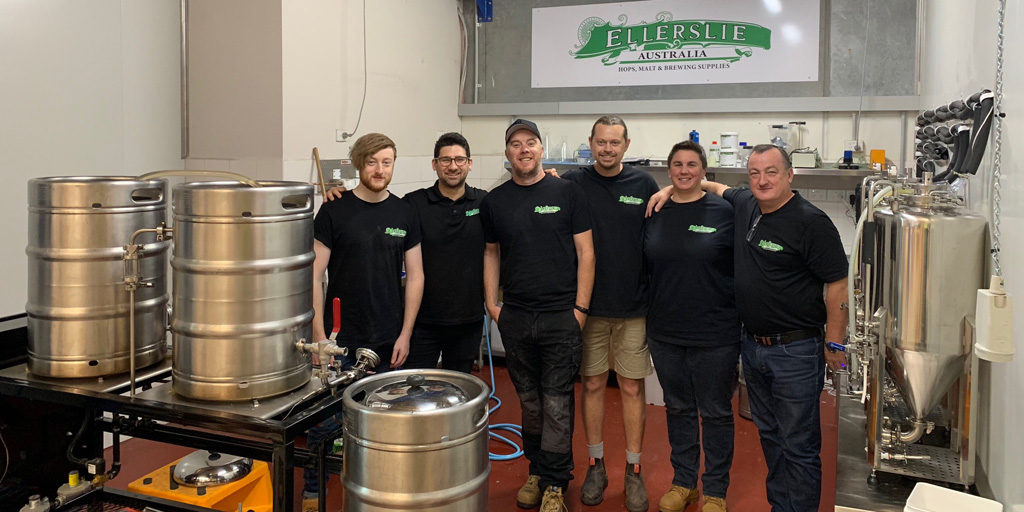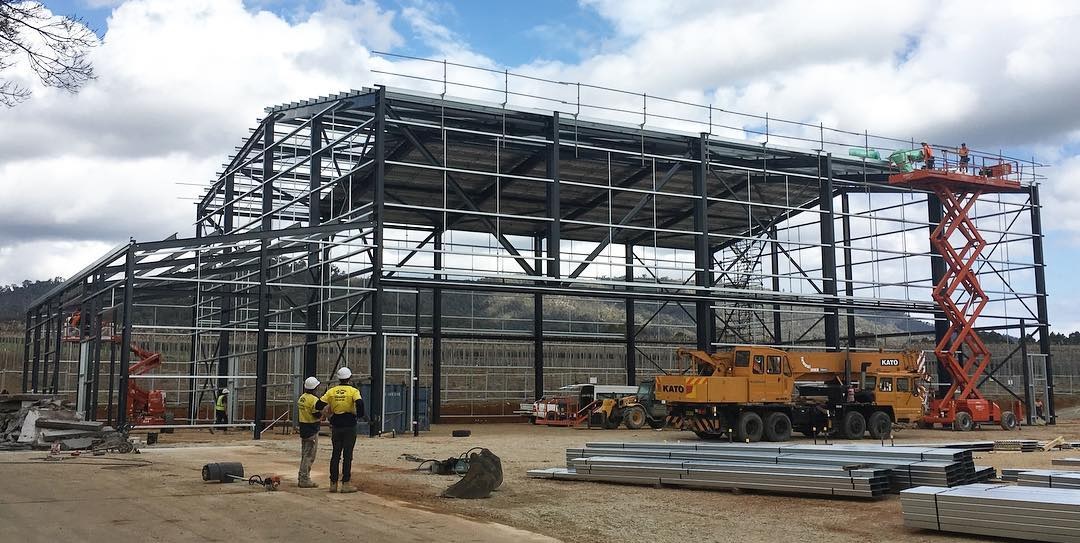
Ellerslie brings in veteran brewer to lead R&D brewery

Glenn Harrison with members of the Ellerslie sales team (l-r) Joshua Croke, Mario Gheorghe, Glenn Harrison, Patrick Matan, Rachelle Rochecouste, Greg Croke.
Ellerslie Hop Estate has brought in brewer Glenn Harrison to lead its R&D department, as it continues to evolve following a major fire in 2018.
Ellerslie reopened earlier this year after the fire razed its site to the ground, and now it has invested in an in-house microbrewery to enable the hop growers to give brewers oversight on flavour profile, hop aroma and bitterness for their hop repertoire, and also provide it with a pilot brewery to develop its own recipes.
Overseeing the project is brewer Glenn Harrison, formerly head brewer at Temple Brewing until 2017 when he moved to Napoleone Brewery in Yarra Glen, Victoria.
He joined Ellerslie in November this year and is keen to get started on his new, smaller system.
“We’ve built a 50L brewhouse with four fermenters, we’re trying to make it as close to a really good little brewery as we could,” Harrison said.
“[I’m] doing trials on Ellerslie hops varieties, the hops they import, and malts and yeast strains.
“It’s an education thing for staff, basically trialling new things, so when our sales guys go out [we can show] we’ve trialled this yeast, this malt, this hop, if you ferment at this temperature you’ll get this, at this temperature you get that.”
He said it was the perfect job for a brewer, and the move was a break from commercial brewing for him.
“I’ve been doing it for 13 or14 years or something. I just wanted a break from that day-to-day grind of brewing, and as most head brewers will tell you, the further you move up the food chain, the further you move away from brewing which is the passion.”
“It’s the reason we do it, to make beer, and you end up spending most of your time doing spreadsheets and other stuff that is not as fun as brewing beer and being creative.
“I [also] wanted to try and spend a bit more time with my family too, it can be 24-hour, you do your events at night, festivals at weekends, get up at 6 in the morning and you can be there at 7 at night if something breaks down,”explained Harrison.
Ellerslie managing director Greg Croke said that the R&D brewery had a twofold purpose.
“One side was to offer a service to people out there, and we’ve already had breweries take up the brewery for their own recipe development,” he said.
“That’s what we put it in for. For people to come, experiment, try making different beers, then they can scale it up if it works and take it back to their breweries and make it a commercial venture.”
It will also help in the development of new hop varieties, he said.
“The flipside of it for us was through our breeding programme, we can pick basically individual lines now and whack them through our little BDU, and see what we come up with and flavour profile our new varieties quicker, to see if they are worth pursuing.
“I can get to that in year 3 or 4 now. In the old days you had to get a couple of kilos to take to a brewery to put them brew.
“By bringing it in house we can experiment more. I’ve worked very much on the theory that were supposed to be the experts in this area so it’s our responsibility to learn, train and get as much knowledge as we can so we can then take this to the brewer.
“That’s why we brought Glenn in, he’s so highly respected in the industry he’s very receptive to everything we’re wanting to do and keen to be part of everything.”

An opportunity arises
The development of the R&D brewery is just part of Ellerslie’s regeneration since the 2018 fire.
“[The fire] was one of those things, you wouldn’t wish on anybody. It was a steep learning curve and we had to make decisions on the fly while we were doing things,” Croke explained.
“But it was an opportunity for us to explore new avenues and come up with new ideas.
“I was very conscious of the impact we were having on the environment, I was conscious of what we’re doing to the planet, how can we minimise this and where can we save from an energy point of view, an environmental point of view, and that was the heavy focus of the design brief.”
The rebuild allowed Ellerslie to focus on issues that were important to them.
“Our picking machines are completely wood free, the feeding systems we developed with a manufacturer out of the States, we worked closely with them to streamline the packing process, reducing our energy and having better control throughout the whole picking process.
“One we got into our kilns, we got really innovative by using hot water as opposed to indirect flame, which is the traditional way of doing it.
“So we don’t pump carbon monoxide, carbon dioxide or sulphur compounds over the hops. We created a closed loop system. So we have no water wastage or loss, our energy bills have gone down substantially.”
Croke said that the development of the Ellerslie brewery and its efforts to become a more responsible, sustainable business
“I’ve said it before, but we work in the best industry. After the fire, the support that we got from breweries and hop growers around the world, it was amazing, it was humbling.
“We wanted to give something back to an industry that has really supported and stood by us over the last 18 months to two years,” he said.



